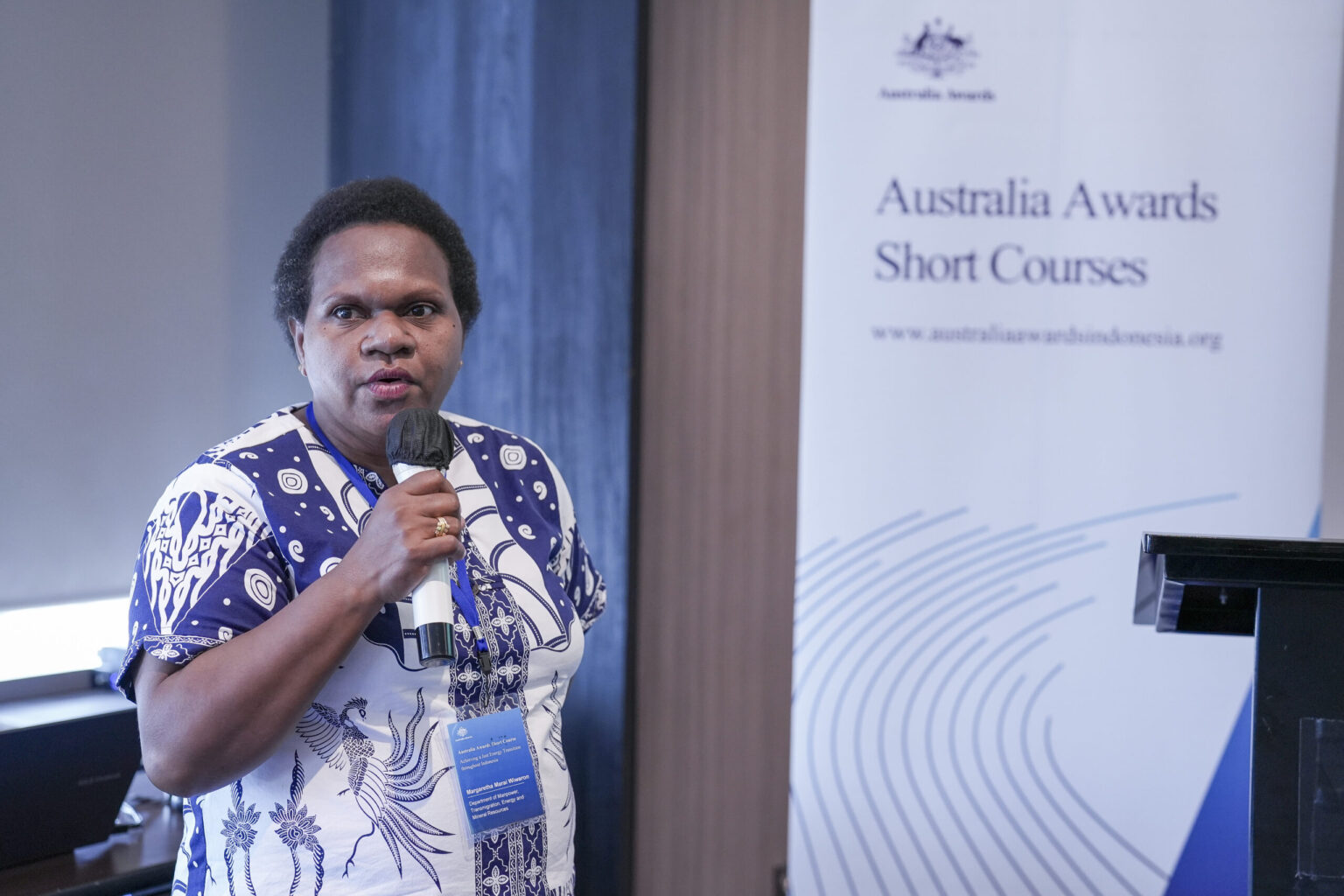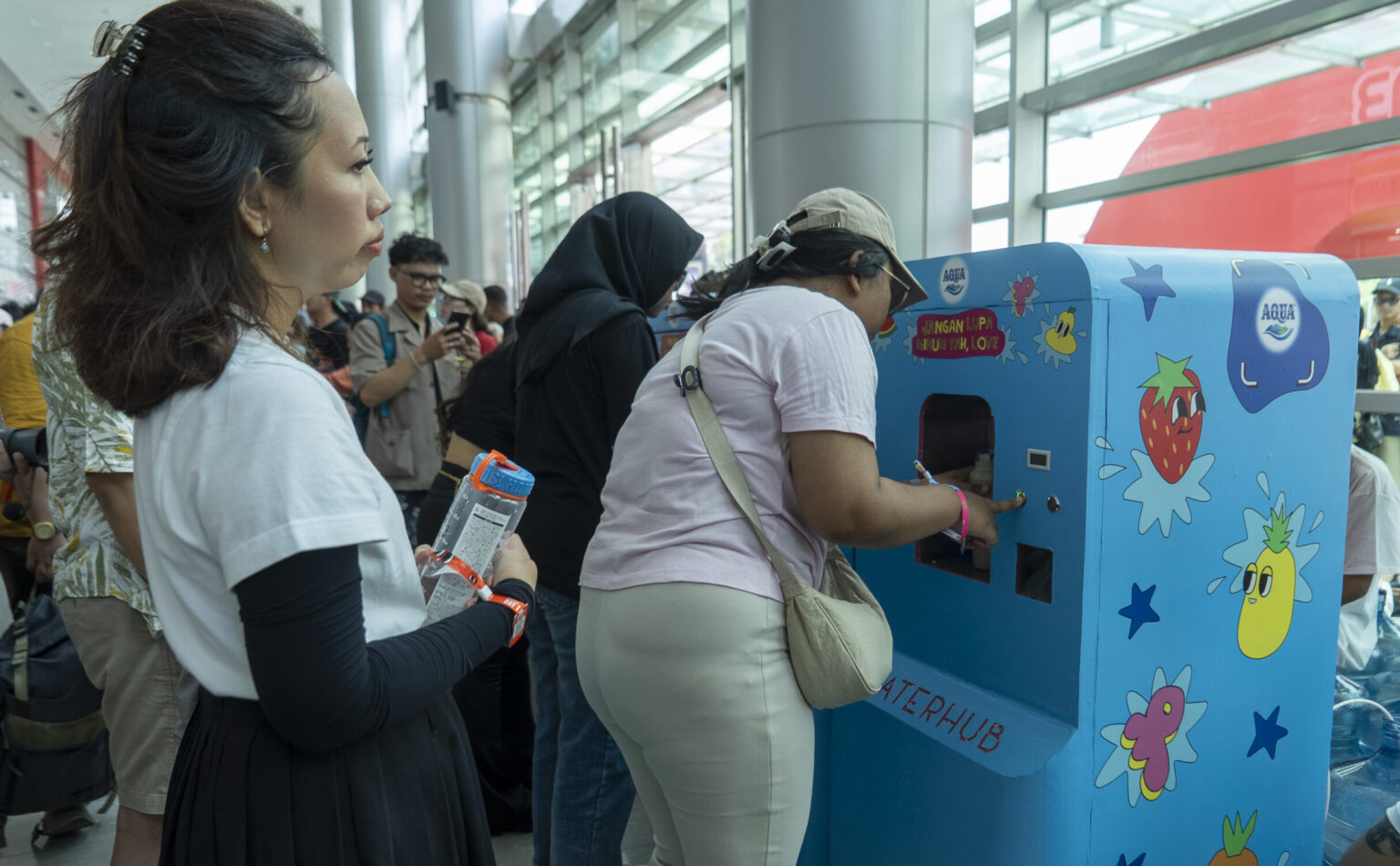
Merauke, in South Papua, is known as the rice granary of Papua.
The Indonesian Government plans to develop a million hectares of rice fields in the regency, as part of its push to bolster food security and reduce reliance on imports.
South Papuan local government employee Margaretha Marai Wiwaron wants to increase the value of rice production further by transforming waste from rice milling into renewable energy sources.
Margaretha, who works at the regional office of the Department of Manpower, Transmigration, Energy and Mineral Resources, says most rice husk waste is currently burned.
But if compressed into briquettes, she says the waste could be used as an alternative to fossil fuels in furnaces, gasified to generate electricity or converted into bioethanol, a sustainable liquid fuel, which can replace kerosene in cooking stoves.

Margaretha Marai Wiwaron plans to form a village-owned enterprise to turn rice husk waste into briquettes.
“I am really interested in biomass energy development,” Margaretha says.
Margaretha is one of 25 leaders in renewable energy in Indonesia selected from 600 applicants to participate in the Australia Awards Short Course on Achieving a Just Energy Transition throughout Indonesia.
“When I return, I plan to form a village-owned enterprise to manage rice husk waste,” Margaretha said.
“The raw materials are free. The enterprise would just collect the waste and process it into briquettes.”
Margaretha wants to help unemployed mothers in Marauke.
“I hope this project can provide them jobs. I want to be a small candle – a small blessing – for Mama-mama Papua (Indigenous Papuan women),” she says. “Because the key to a happy family is women. Children can grow up healthy and intelligent if they are raised in a healthy family, where their mothers have jobs and money to provide food, clothing and education.”

Course leader Professor Prasad Kaparaju, an energy transition specialist from Griffith University.
The course, which is supported by KINETIK Australia-Indonesia Partnership for Climate, Renewable Energy and Infrastructure and run by Griffith University, draws on Australia’s experience in moving to renewable energy.
“Australia and Indonesia have similar challenges in meeting the energy transition and net zero emissions,” says course leader Professor Prasad Kaparaju, an energy transition specialist from Griffith University whose research areas include biomass to biofuel conversion technologies.
“We also have common issues related to increasing energy demand, remote communities and ensuring the affordability of the energy that we produce.”
The course examines the role of climate finance, supplying electricity to remote and disadvantaged communities, First Nations-led renewable energy initiatives and the constraints to the adoption of gender and disability-inclusive energy policy.
The participants spent two weeks in Melbourne and Brisbane from May 24 to June 6, in addition to pre-course and post-course workshops in Indonesia.

The Short Course participants at a Waste-to-Energy project in Melbourne. Photo: STENY RISAMBESSY
They met David Shankey, the inaugural CEO of the Net Zero Economy Authority, which was established to ensure Australian workers, industries and communities share the benefits of the net-zero transition.
The participants also visited Latrobe Valley in regional Victoria, where a major coal-fired power station was decommissioned in 2017 and another is scheduled to close in 2028.
The decommissioned power station has been repurposed to host a battery energy storage system, which is designed to store the equivalent of one hour of electricity generated by rooftop solar systems on approximately 30,000 Victorian homes.
“A couple of years ago there was a coal power plant emitting so much CO2 and now they have one of the largest solar power plants on the same site with the battery storage,” Professor Kaparaju told the participants at a pre-course workshop in Jakarta.
“So this is the vision that you will see. Because if you want to make policies you want to really learn lessons from a coal-powered plant that has been decommissioned and the strategies for reskilling employees, so no one is left behind in the process of energy transition to renewables.”
The participants will develop a project as part of the Short Course program, which they will implement when they return to their workplaces in Indonesia.
Participant Dendy Satrio, an Associate Professor at the Department of Ocean Engineering at Institut Teknologi Sepuluh Nopember in Surabaya, is working on a project on the technical feasibility of ocean wave energy in Indonesia.
Wave energy, also known as wave power, transfers the kinetic energy from waves into electrical energy.
“I want to find out the locations that have potential for ocean wave energy,” Dendy said.
“I hope this can assist the government or companies engaged in the energy sector, such as PLN. If this energy is harnessed it will help local communities, especially people living on small islands in Indonesia.”
Associate Professor Dendy said he would teach his students at Institut Teknologi Sepuluh Nopember what he learned from the course and site visits in Australia. “The information and experience will not stop with me, but I will pass it onto my students so that it can be useful to more people.”
Professor Kaparaju said the need to transition to renewable energy to meet net-zero emissions was something that had been taught for years.
But he noted the importance of a just transition – one that is fair, inclusive and equitable for workers, communities and countries most affected by the change – was a newer concept.
“This has come recently – how can we include every person in this journey? That’s why this course is very important, to ensure that as leaders in this field we don’t leave anyone behind.”
Participant Chris Londong is the CEO and founder Waus Energy, a start-up based in Manado in North Sulawesi that converts plastic waste and used oil into renewable energy.
He said there were three major issues he wanted to address – low-value plastic waste, imported cooking fuel and people in remote areas paying too much due to high distribution costs.
“Through this project, we want to offer a local solution in Manado,” he said.
“By processing waste into fuel, we can reduce pollution and supply cheap energy to remote island communities.”



